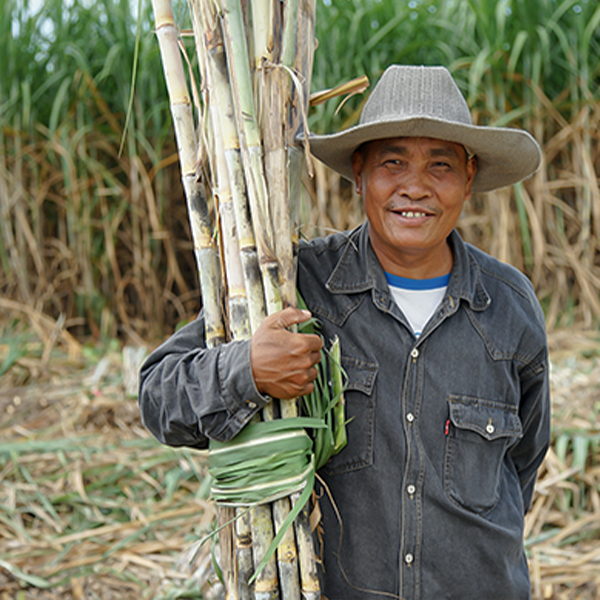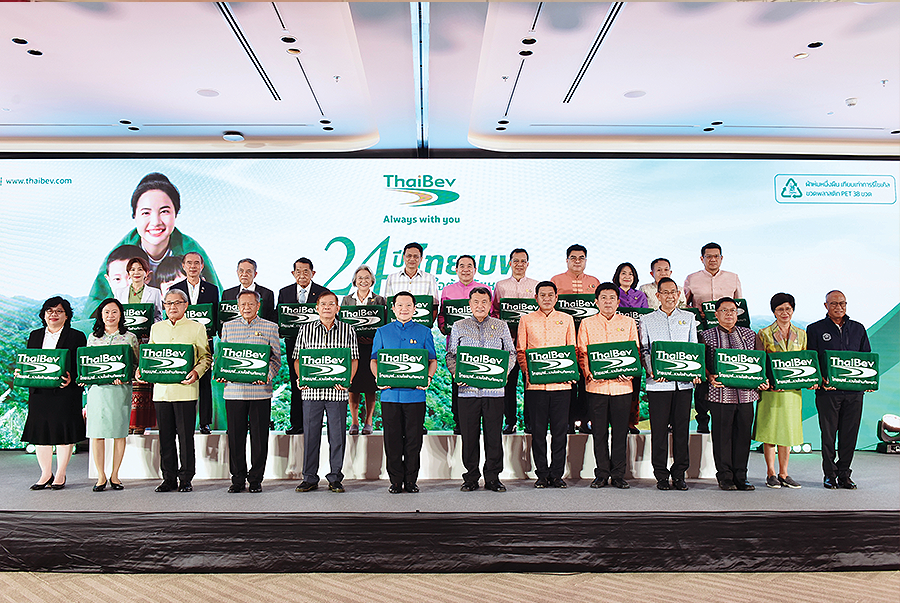
Under the concept of “Beyond the Green Blanket…
A Sustainable Community of Giving”, ThaiBev has
collaborated for the past 24 years with the Department of Disaster Prevention and Mitigation, Ministry of Interior,
and a network of government and private-sector partners to deliver “green blankets” to villagers affected by the cold. In total, 4,800,000 blankets have been donated.
This is the fourth year that we have produced eco-friendly blankets, by recycling 7,600,000 PET plastic bottles
to make 200,000 blankets per year. So far, a total of 30,400,000 PET plastic bottles have been recycled
to produce 800,000 “green blankets”.
ThaiBev distribute effluent from the bio-gas production process of a distillery as a soil conditioner to local sugar cane farmers in Khonkhan province because it contains essential nutrients for plant growth, particularly for sugarcane. According to research, distillery slop has been found to increase sugarcane yields without causing negative environmental impacts when used in the farm areas. This utilization of distillery slop can reduce farmers' expenses on chemical fertilizers and result in an increased yield of approximately 10,000-15,000 baht per rai (0.39 acre).
In 2023, ThaiBev supported the distribution of soil conditioner to farmers in the Khon Kaen province for use in over 2,600 rai (around 1,027 acre) of sugar cane fields, which amounts to more than 212,000 cubic meters.
This is a sustainability project that aims to build relationships with communities. The process is participatory, involving collaborative thinking, action, and development to create projects in three work groups: agriculture, processing, and community tourism. The goal is to develop local economies and increase income for communities so that they can manage themselves sustainably.
Over the past five years, the project has operated in
32 provinces and generated a total of 65,814,260 Baht
in community income. In 2023, it generated income
for 105 communities, totaling 24,380,712 Baht,
with 3,122 beneficiaries.
This project aims to solve the problem of forest fires and haze by focusing on the local ecosystem as a whole, including sustainable management of forests, land, and resources and community economic development. The project promotes the cultivation of bamboo according to agroforestry concepts, rather than monoculture crops. This helps prevent and control the expansion of arable areas, which causes soil deterioration. It’s a sustainable solution to the smog problem caused by forest fires in Chiang Mai Province.
ThaiBev is supporting the purchase of 20,000 bamboo seedlings to plant on a land area totaling 326 rai in
6 sub-districts of Mae Chaem District: Kong Khaek,
Pang Hin Fon, Ban Thap, Tha Pha, Mae Na Chon, and
Mae Suek. The communities are encouraged to participate
in the project by growing the Phai Sang Mon and Phai Ruak Dam varieties of bamboo. The first plot was started at the end of 2017. Whole bamboo can be sold and processed into more than 20 home decoration products, which has generated more than 1,637,200 Baht of income for the communities.
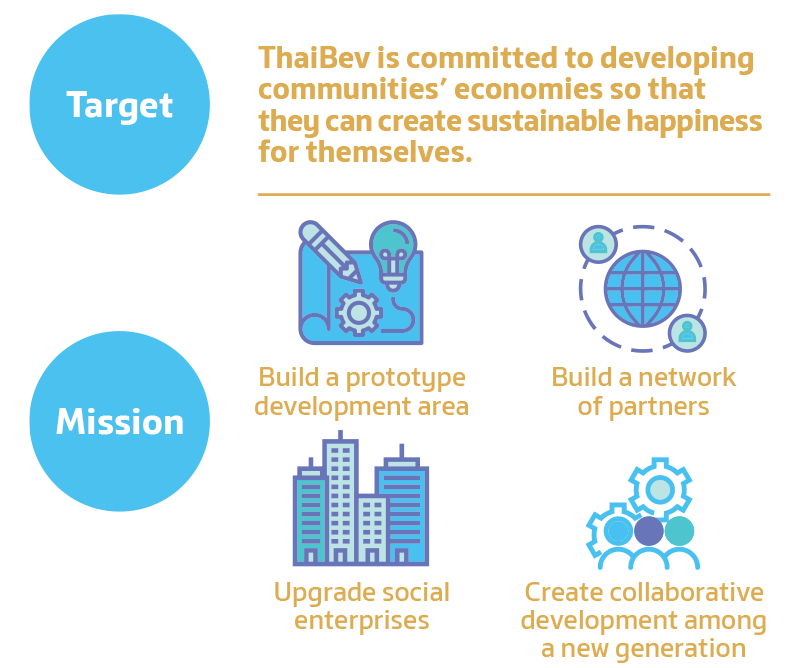
The problems of flooding in the rainy season and drought in summer bring great damage to agricultural communities. In the upland area of Ban Kaeng Sai Mun, Tha Ton Sub-district, Mae Ai District, Chiang Mai Province, the basin between
the mountains is steep. In the rainy season, this causes the soil to subside, causing damage to villagers’ homes and accumulating in the reservoir.
ThaiBev, therefore, has supported the Ban Kaeng Sai Mun community of 746 households (1,897 people) in building gabion box-type weirs to slow the water along three flood routes. A total of 13 weirs have been built as barriers to prevent landslides in the long term. It also helps reduce
soil erosion and the intensity of the water currents in the creek, as well as creating moisture for the watershed
forests of the community.
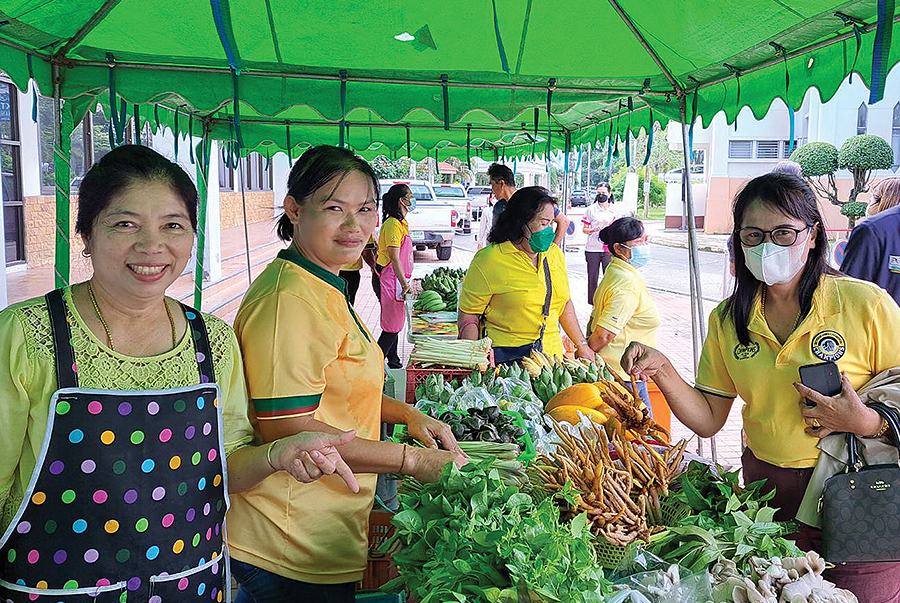
This project helps to develop communities in Phunphin and Tha Chang districts around our Surat Thani factory. It uses the holistic Bio-Circular-Green economic model: “Bio” means focusing on using biological resources to create added value; “Circular”, reusing materials as much as possible; and “Green”, aiming to develop the economy and environment together in a balanced way to achieve sustainability.
In this case, the “Bio” emphasis is on agriculture and processing, such as producing safe vegetables and growing mushrooms; “Circular” is about producing bio-compost
from waste to reduce costs for farmers and for waste management, with the savings going into community welfare funds; and “Green” is about community forestry, creating
the Yang Hiang Tree Bank for conservation.
Six communities totaling 395 people benefit from the projects, with more than 20 network organizations
participating. The extent of green areas has been increased by 65 rai and the amount of waste from the factory has been reduced by 600 tonnes per year, while meeting the safety standards of the UN’s Good Agricultural Practices.
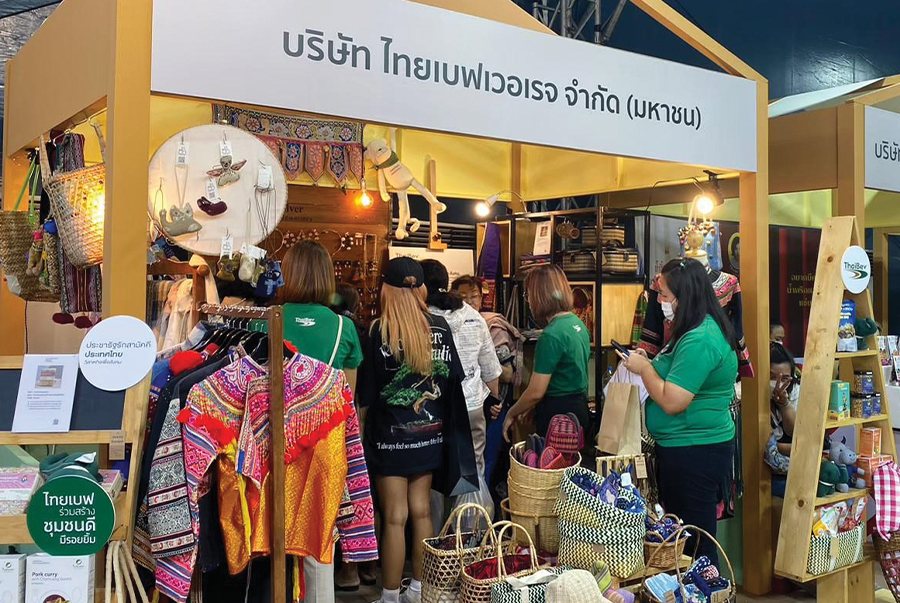
ThaiBev continues to open marketing channels for selling community products online, including through the Line application. Communities are encouraged to learn online selling skills, as well as to bring products to sell at various events.
Currently, the Chumchondee Meeroiyim Shop Line account has 1,548 followers and has generated 359,240 Baht of income for the 27 participating communities
(1,197 beneficiaries).
ThaiBev supports government policy to develop the grassroots economy according to the Sufficiency Economy Philosophy, with the goal of “generating income for the community to create happiness”. Accordingly, we established the Pracharath Rak Samakkee (PRS) Social Enterprise (Thailand) Co., Ltd., which coordinates a provincial network
of 76 PRS social enterprises.
In the past seven years, the Pracharath Rak Samakkee
Social Enterprise Network has helped drive a total of 1,552 community projects in three work groups: agriculture, processing, and community tourism. It has generated over 2,141 million Baht of community income, creating jobs for more than 114,362 households in 4,852 communities. In 2022, 414 million Baht of community income was generated. The project has succeeded in reducing inequality, improving
quality of life, and increasing the competitiveness of communities.
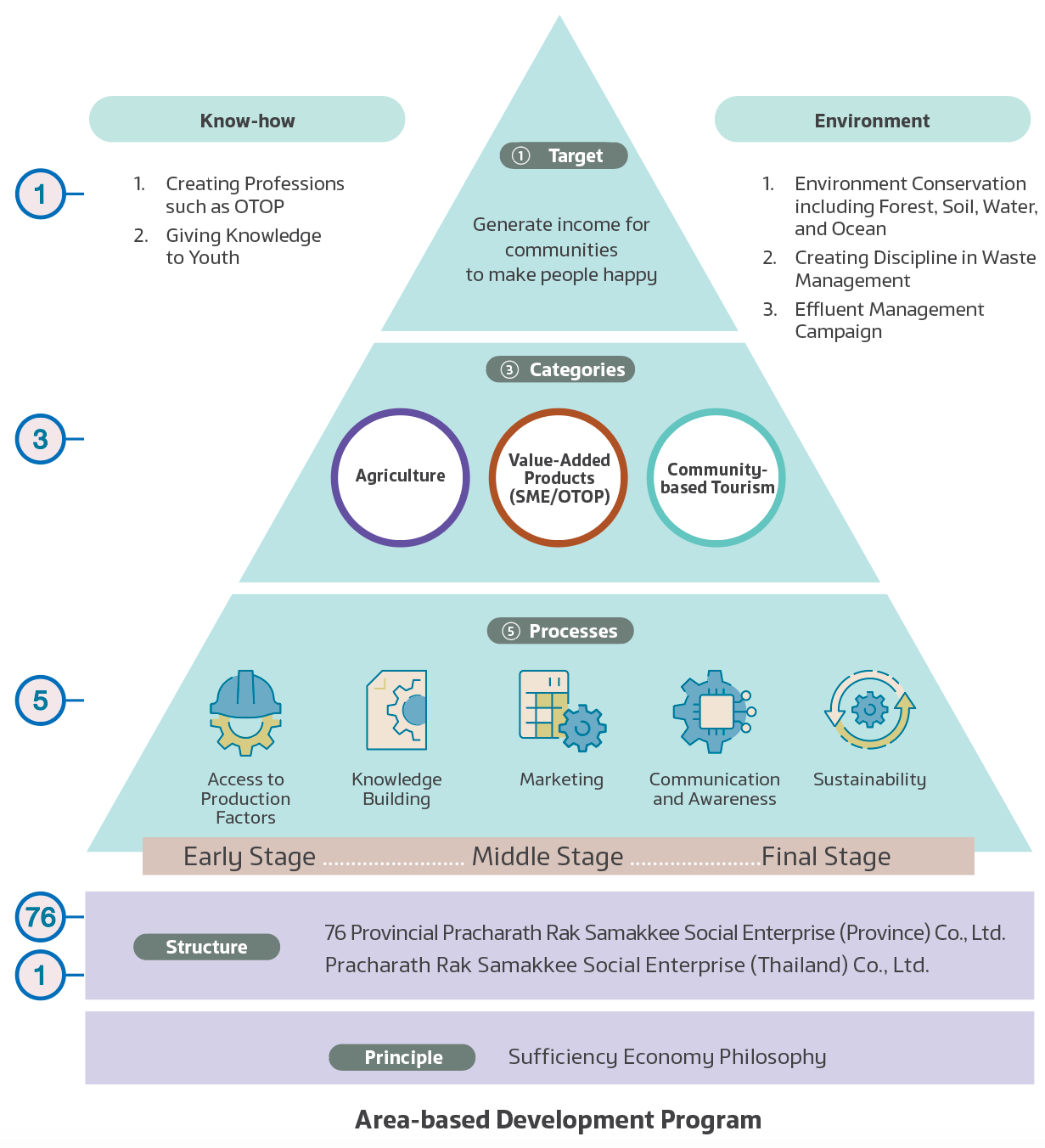
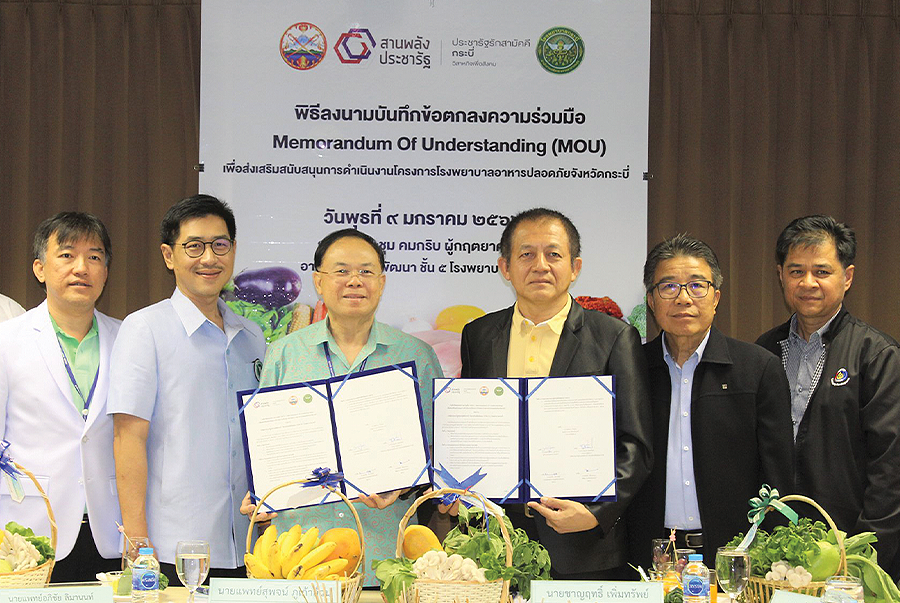
In collaboration with the Community Organization
Development Institute, the Ministry of Agriculture and Cooperatives, the Ministry of Commerce, the Ministry of Interior, and the Ministry of Public Health, Pracharath Rak Samakkee has developed a project to connect farmers’ networks with provincial government hospitals, which creates markets for safe agricultural products and helps
to ensure food safety in public health facilities.
Since its introduction, the Hospital Food Safety Project has generated more than 322 million Baht of community income. Forty provinces in the PRS network have joined the project, with 5,724 beneficiaries and 53 participating hospitals.
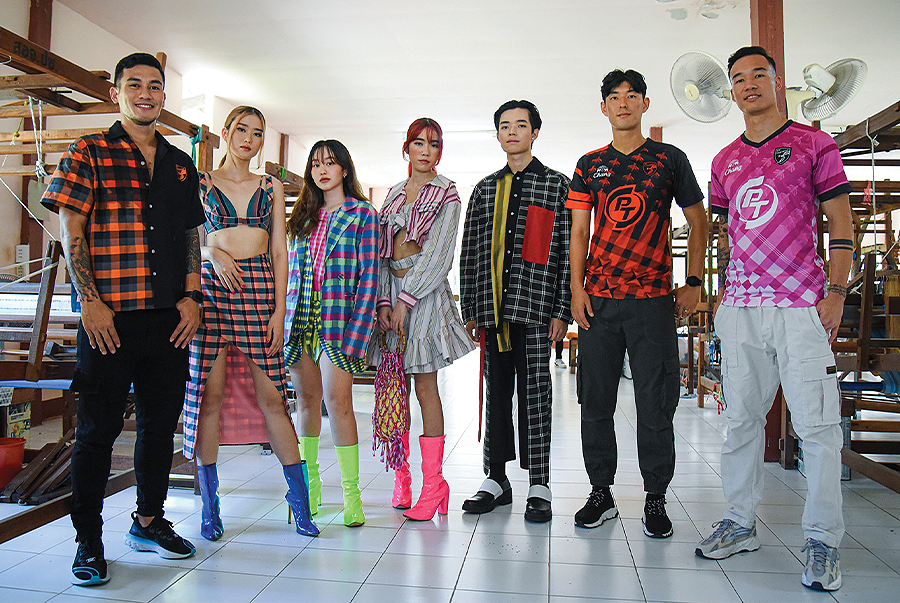
Established in 2016, this project aims to create awareness and change consumers’ perceptions of pakaoma traditional fabric. It promotes knowledge and innovation in local production as well as creating sustainable income for communities.
Throughout 2023, the Local Pakaoma Project has been working with 18 weaving communities and 16 universities on the Creative Young Designers initiative, in order to exchange knowledge about product development and promote
natural fibers, colors, and production processes to reduce
environmental impacts.
Currently, the project involves 40 communities of pakaoma weavers and 1,561 beneficiaries, spread across 30 provinces and generating total revenue of more than 235 million Baht.
Started in 2020, this project invites the public to travel
along the same route that Luang Pu Mun used to visit
36 destinations in 12 provinces and learn about the history, practices, and teachings of the revered monk. It promotes collaboration between homes, temples, and schools according
to the “BOWON” principle and aims to create community tourism routes that will generate sustainable income.
In 2023, the project’s activities were expanded to include: nine meditation practice sessions for 175 people; training activities in Sakon Nakhon Province for community
storytellers to continue the legend of Luang Pu Mun Bhuridatta (60 storytellers passed the training); a press tour to trace the footsteps of Luang Pu Mun in Nakhon Nayok Province; the installation of exhibition boards to tell the story of the revered monk at Wat Pathum Wanaram, Bangkok,
and Wat Sittiyaram in Amnat Charoen Province; and the construction of benches along Bintabaht Road in
Ban Nong Phue, Nanai Sub-district, Phanna Nikhom District, Sakon Nakhon Province.
In 2023, the project generated a total of 6,977,272 Baht
of community income.









